Share
Working at ESO
Are you interested in working in areas of frontline technology and in a stimulating international environment? Do you feel your profile matches our requirements? Learn more about our current vacancies and apply online. Read more..
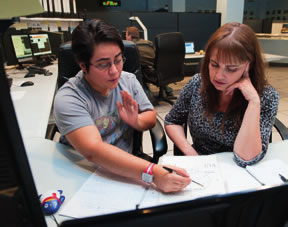
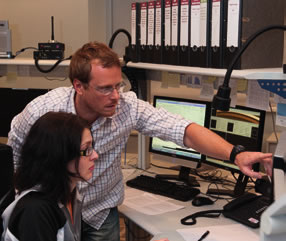

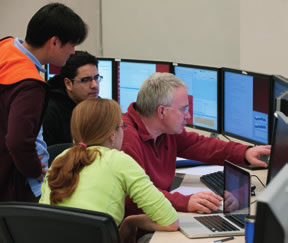
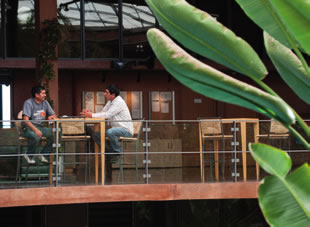

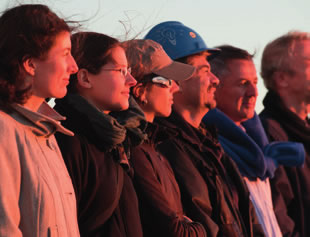
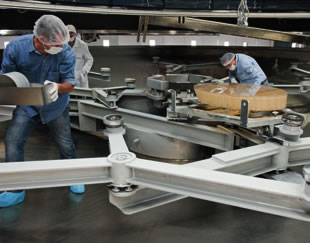
The European Organisation for Astronomical Research in the Southern Hemisphere (ESO) is the foremost intergovernmental astronomy organisation in Europe and the world's most productive ground-based astronomical observatory. ESO carries out an ambitious programme focused on the design, construction and operation of powerful ground-based observing facilities enabling astronomers to make important scientific discoveries.
ESO operates three unique world-class observing sites in northern Chile: La Silla, Paranal and Chajnantor (home to ALMA), and the ESO Headquarters are located in Garching, near Munich, Germany.
At Paranal, ESO operates the Very Large Telescope, the world's most advanced visible-light astronomical observatory, and will host and operate the southern array of the Cherenkov Telescope Array, the world's largest and most sensitive high energy gamma-ray observatory. ESO is a major partner in ALMA. On Cerro Armazones, ESO is building the 39-metre Extremely Large Telescope (ELT), which will become "the world's biggest eye on the sky" and whose operations will be fully integrated into the Paranal Observatory.
The instrumentation programmes of the ESO optical/IR telescopes together represent the most ambitious ground-based instrumentation programmes in the world. These programmes are being merged into a single programme, therefore, for its Directorate of Programmes at its Headquarters in Garching, near Munich, Germany, ESO is advertising the position of
Instrumentation Programme Manager
Garching
Deadline 11/02/2024
The Directorate of Programmes is responsible for the management and delivery of ESO's construction programmes and projects within ESO's matrix organization. The overall work is broken down into three programmes:
- the ELT Construction Programme;
- the Instrumentation Programme (which is the subject of this vacancy); and
- the Technology Development Programme.
The ESO community is deeply involved in the development of instruments for the ESO observatories, with most projects delivered by collaborations between research institutes in the ESO member states and ESO in return for Guaranteed Time Observations. As Instrumentation Programme Manager, you will be an active astronomer and member of the ESO Faculty, able to understand the needs of the programme; you will be responsible for the planning and successful delivery of the entire optical/IR instrumentation programme (circa 30 MEUR per annum in the post ELT construction era). Specifically, you will be responsible for the delivery of new instruments for the ELT, VLT and La Silla as well as and upgrades to the existing instruments of La Silla and Paranal, including the required modifications to the observatory infrastructure.
You will work closely with the Consortium Principal Investigators, the ELT, VLT and VLTI Programme Scientists (who ensure the scientific drive of the Instrumentation Programme), and will provide strategic leadership and overall management, coordinating the work with external institutes, as well as the project managers, project engineers and project scientists from the Directorates of Programmes, Engineering and Science. You will be supported by two Deputy Programme Managers, one for ELT and one for the VLT/I instrumentation, a Programme Engineering Team and the Programme Planning and Controls Office of the Directorate of Programmes.
Main Duties and Responsibilities:
You will be responsible for:
- Leading the Instrumentation Programme to ensure that it meets the needs of the ESO community;
- Work to ensure that the lessons learned from past instrument projects are taken on board;
- Proactively working to ensure the long-term effectiveness of the programme, including developing a sustainable approach to delivering ELT-class instrumentation;
- Organising Programme level lessons learned exercises;
- Preparation of a medium to long-term programme plan, working alongside the Programme Scientists, ensuring that effort and costs are properly included in ESO budgets and with plans;
- Initiating new projects in collaboration with the Programme Scientists in line with the Programme goals;
- Reporting on the delivery of the Programme to ESO's governing and advisory bodies;
- Setting of the relative priorities of projects within the programme;
- Ensuring safety and quality assurance is applied within the programme as agreed with Director of Programmes, including oversight of all projects;
- Empowering the individual project teams within the programme;
- Dealing with problems and difficulties outside the scope of the project teams and resolving conflicts where necessary;
- Providing formal input to the appraisal and providing specific objectives for the ESO Project Managers and Project Scientists working on the Programme; and
- Conducting an independent personal astronomy research programme with up to 50% of your time available.
Reports to:
ESO Director of Programmes.
Key Competences and Experience:
Essential Competences and Experience
- A minimum of ten years' experience in leading/developing astronomical instrumentation and/or leading programmes of similar complexity, including dealing effectively with the differing views of the various stakeholders;
- Leadership, and change management;
- Motivated, proactive team player;
- Excellent interpersonal and communicational skills, and a demonstrable ability to establish and maintain effective working relationships at all levels;
- Strong negotiation and influencing skills;
- Creative thinking and well developed problem-solving abilities,
- Detail-oriented;
- Political intelligence and influence, being able to manage internal and external stakeholder relationships and mediate in discussions to resolve issues;
- Ability to take difficult decisions balancing conflicting priorities and agendas of all stakeholders;
- Capacity to work under pressure and ability to multi-task and manage various project elements simultaneously;
- Strong ability to lead and engage teams that are culturally diverse and geographically distributed;
- Creates synergies inside and outside the organisation ensuring that resources are used optimally, cost effectively and transparently;
- Established record of management, including budget and staff management; and
- Established track record of astronomical research and publication.
Desirable Competences and Experience
- Experience of ESO instrumentation would be an advantage.
Qualifications:
PhD in astronomy, astrophysics or physics.
Language Skills:
An excellent command of written and spoken English is essential.
Remuneration and Contract:
We offer an attractive remuneration package including a competitive salary, comprehensive pension scheme and medical, educational, and other social benefits, as well as financial help in relocating your family and support to place your child/children in day-care.
Our Salary Structure
ESO's salary structure is based upon a range of career paths which reflect the nature and level of our jobs. Each career path is made up of two or three grades which are used to further reflect experience.
Please follow this attached link for more details https://www.eso.org/public/jobs/conditions/intstaff/salary-structure/
ESO aims to support members of personnel in maintaining a good work-life balance (https://www.eso.org/public/jobs/conditions/intstaff/#work-life-balance) between their professional and private life. ESO is also committed to offering family-friendly support (https://www.eso.org/public/jobs/conditions/intstaff/#family-friendly-support), creating a work environment and policies which allow staff to balance their professional and private responsibilities through flexible working arrangements and financial support for families.
The contract is for a fixed term duration of three years, and is subject to successful completion of the probation period. There may be a possibility of extension(s) subject to individual performance and organisational requirements, and as defined in the applicable policies and staff rules and regulations. For any further information, please visit ESO's conditions of employment (https://www.eso.org/public/jobs/conditions/). Please note that the contract policy and in particular the regulations concerning fixed-term and indefinite contracts are currently under review which may lead to changes in the contractual conditions applicable to this position.
Duty Station:
Garching near Munich, Germany with regular duty trips to all ESO sites in Chile and consortium locations.
Career Path:
The post is Career Path VII and as such will require Council approval.
Application:
If you are interested in working in areas of frontline science and technology and in a stimulating international environment, please visit http://www.eso.org for further details.
Applicants are invited to apply online at http://jobs.eso.org/. Applications must be completed in English and should include a motivation letter, CV containing a publication list and a research statement. Also required are the names and contact details of three persons familiar with your work and willing to provide a reference letter. Referees will be automatically invited to submit their letter, however, applicants are strongly advised to trigger these invitations (using the web application form) well in advance of the application deadline.
Deadline for applications is 11 February 2024.
Interviews are expected to start soon after this date.
ESO Values
An important element in any successful employment relationship is harmony in values between an organisation and its people.
The ESO Values are:
ESO strives for excellence through innovation.
ESO provides outstanding services to its communities.
ESO fosters diversity & inclusion.
ESO believes in the key role of sustainability for its future.
Achieving the above are recognized as only possible on the basis of personal values and attitudes that we expect from our employees: respect, integrity, accountability, commitment, collaboration, and clear & open communication.
Applicants to any ESO role are asked to reflect on their affinity with these values and advised they may be asked about them if called for interview.
Diversity
ESO has established diversity as an important value of the Organisation, is committed to providing an equal opportunities environment and is actively seeking to promote a diverse, equitable and inclusive workforce. Please visit https://www.eso.org/public/about-eso/sustainability/dei-at-eso/ for further details.
Nationality
No nationality is in principle excluded from employment at ESO, however, recruitment preference will be given to nationals of our Member States, host states and strategic partners: Australia, Austria, Belgium, the Czech Republic, Denmark, Finland, France, Germany, Ireland, Italy, the Netherlands, Poland, Portugal, Spain, Sweden, Switzerland, the United Kingdom and Chile, irrespective of gender, age, disability, sexual orientation, ethnicity or religion.
